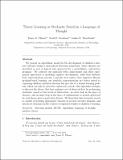| dc.contributor.author | Goodman, Noah D. | |
| dc.contributor.author | Tenenbaum, Joshua B. | |
| dc.contributor.author | Ullman, Tomer David | |
| dc.date.accessioned | 2016-05-16T13:24:33Z | |
| dc.date.available | 2016-05-16T13:24:33Z | |
| dc.date.issued | 2012-08 | |
| dc.date.submitted | 2012-06 | |
| dc.identifier.issn | 08852014 | |
| dc.identifier.uri | http://hdl.handle.net/1721.1/102507 | |
| dc.description.abstract | We present an algorithmic model for the development of children's intuitive theories within a hierarchical Bayesian framework, where theories are described as sets of logical laws generated by a probabilistic context-free grammar. We contrast our approach with connectionist and other emergentist approaches to modeling cognitive development. While their subsymbolic representations provide a smooth error surface that supports efficient gradient-based learning, our symbolic representations are better suited to capturing children's intuitive theories but give rise to a harder learning problem, which can only be solved by exploratory search. Our algorithm attempts to discover the theory that best explains a set of observed data by performing stochastic search at two levels of abstraction: an outer loop in the space of theories and an inner loop in the space of explanations or models generated by each theory given a particular dataset. We show that this stochastic search is capable of learning appropriate theories in several everyday domains and discuss its dynamics in the context of empirical studies of children's learning. | en_US |
| dc.description.sponsorship | James S. McDonnell Foundation. Causal Learning Collaborative | en_US |
| dc.description.sponsorship | United States. Office of Naval Research (N00014-09-0124) | en_US |
| dc.description.sponsorship | United States. Army Research Office (W911NF-08-1-0242) | en_US |
| dc.description.sponsorship | National Science Foundation (U.S.). Graduate Research Fellowship | en_US |
| dc.language.iso | en_US | |
| dc.publisher | Elsevier | en_US |
| dc.relation.isversionof | http://dx.doi.org/10.1016/j.cogdev.2012.07.005 | en_US |
| dc.rights | Creative Commons Attribution-NonCommercial-NoDerivs License | en_US |
| dc.rights.uri | http://creativecommons.org/licenses/by-nc-nd/4.0/ | en_US |
| dc.source | MIT web domain | en_US |
| dc.title | Theory learning as stochastic search in the language of thought | en_US |
| dc.type | Article | en_US |
| dc.identifier.citation | Ullman, Tomer D., Noah D. Goodman, and Joshua B. Tenenbaum. “Theory Learning as Stochastic Search in the Language of Thought.” Cognitive Development 27, no. 4 (October 2012): 455–480. | en_US |
| dc.contributor.department | Massachusetts Institute of Technology. Department of Brain and Cognitive Sciences | en_US |
| dc.contributor.mitauthor | Ullman, Tomer David | en_US |
| dc.contributor.mitauthor | Tenenbaum, Joshua B. | en_US |
| dc.relation.journal | Cognitive Development | en_US |
| dc.eprint.version | Author's final manuscript | en_US |
| dc.type.uri | http://purl.org/eprint/type/JournalArticle | en_US |
| eprint.status | http://purl.org/eprint/status/PeerReviewed | en_US |
| dspace.orderedauthors | Ullman, Tomer D.; Goodman, Noah D.; Tenenbaum, Joshua B. | en_US |
| dspace.embargo.terms | N | en_US |
| dc.identifier.orcid | https://orcid.org/0000-0002-1925-2035 | |
| dc.identifier.orcid | https://orcid.org/0000-0003-1722-2382 | |
| mit.license | PUBLISHER_CC | en_US |
| mit.metadata.status | Complete | |
